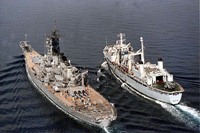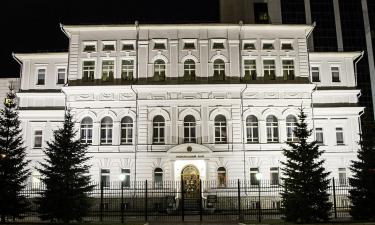Ship carrying humanitarian aid for Somalia refuses to leave Kenya
A ship carrying tons of U.N. humanitarian aid for this impoverished nation refused to leave Kenya because of rampant piracy off Somalia's coast.

The U.N. World Food Program has appealed for high-level international action to secure the waters off the coast, saying piracy is threatening aid deliveries to a country trying to recover from the worst fighting in more than a decade.
The ship had been scheduled to sail to Somalia on Sunday with 850 tons of food. But the shipping agency contracted by WFP has demanded the Kenyan government provide security for travel into Somali waters. On Saturday, pirates launched a failed hijack attempt on a WFP boat, killing a Somali guard.
"We need some sort of security to ply into Somali waters ... because they (Somali pirates) are everywhere. Now they are ashore, very far off into the sea. It is becoming too much," Inayet Kudrati of Motaku Shipping Agency said Monday.
A Kenyan government spokesman did not immediately return calls for comment. Peter Smerdon, spokesman for WFP, said he had no comment on the contractor's security arrangements, as long as they were acceptable to Somali and Kenyan authorities.
Saturday's attack was the eighth this year off Somalia's 1,880-mile (3,025-kilometer) coast, which is near crucial shipping routes connecting the Red Sea with the Indian Ocean. Somali pirates are trained fighters, often dressed in military fatigues, using speedboats equipped with satellite phones and Global Positioning System equipment.
"Although there are coalition forces operating in the area, they cannot be everywhere monitoring every ship that passes the coast of Somalia," the U.S. Navy's Maritime Liaison Office in Bahrain said in a statement. It urged ships to stay 200 nautical miles off Somalia's coast.
In 2005, two ships carrying WFP aid were overwhelmed by pirates. The number of overall reported at-sea hijackings that year was 35, compared with two in 2004, according to the International Maritime Bureau.
The bandits target both passenger and cargo vessels for ransom or loot, using the money to buy weapons.
Piracy is just one of the obstacles to humanitarian aid in a country that is also battling an Islamic insurgency. Ethiopian troops backing Somalia's fragile government killed one person and injured another Monday after their convoy was targeted by a land mine in the Somali capital, witnesses said.
It was the latest in a series of explosions targeting convoys carrying government officials or troops. The government has blamed Islamic guerrillas, who have vowed to launch an Iraq-style insurgency until Somalia is ruled by the Quran.
At the end of April, the government declared victory in battles against insurgents and Somalia's long-standing clan rivals. Battles in Mogadishu between March 12 and April 26 alone killed at least 1,670 people. Since February, 400,000 Mogadishu residents have fled violence in the capital.
Although the capital is relatively calm, sporadic bursts of violence have been deadly.
In Monday's attack on the Ethiopians' six-vehicle convoy, a land mine detonated in front of the first pickup truck, said witness Abdi Ma'alin, who was walking nearby.
"The explosion was so huge that it sent volumes of smoke into the sky," Ma'alin said.
The troops opened fire in all directions soon after the blast, and controlled the scene for 15 minutes before they continued their journey, said another witness, Sahal Sheik, who sells sheep in a mini market nearby.
"I saw one civilian body lying on the curb, and another with blood on his shoulder running toward the residential neighborhoods," he said.
A day earlier, a bomb explosion near Mogadishu Mayor Mohamed Dheere's convoy killed at least two civilians. Dheere was unharmed. Another bomb attack on Thursday targeted the prime minister's convoy, but no one was hurt.
Subscribe to Pravda.Ru Telegram channel, Facebook, RSS!





